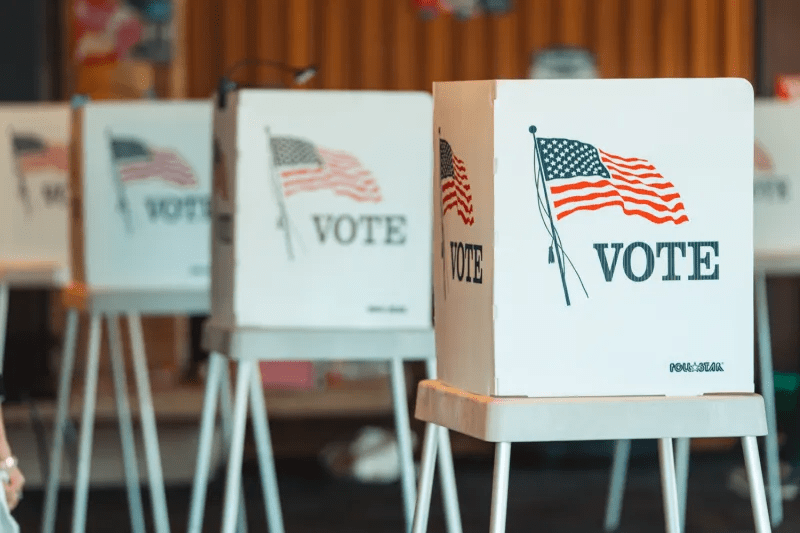On Election Day, students campaigning for Peter Dixon outside Tresidder Memorial Union were asked to leave by a University administrator — an incident they described as voter suppression.
At 8 a.m. on March 5, Ethan Asher ’24, a student involved with the Peter Dixon for Congress campaign, asked poll workers at Tresidder Memorial Union about the rules for election tabling. An election official handed Asher a booklet with official information on electioneering and pointed at a physical boundary — green tape 100 feet away from the ballot box that as a campaigner, he could not cross.
He and Sophia Woodrow ’24 set up tables outside Tresidder with campaign materials. Several hours later, around 6:45 p.m., they said they were asked to leave by Jeanette Smith-Laws, the director of operations and student unions.
The students were ultimately allowed to stay, albeit without the chairs and tables originally provided by Stanford. They said the incident represents an instance of voter suppression, and have filed complaints with the California Secretary of State and the Santa Clara County Registrar’s office.
“The University encourages freedom of expression and its policies do not inhibit the expression of personal political views. To our knowledge, students engaged in campaign activities outside Tresidder Memorial Union were able to continue their pursuits,” Pat Harris, a University spokesperson, wrote.
Asher said the purpose of tabling was not to convince voters to support their candidate, but to speak with undecided voters and celebrate democracy. “It was like, ‘Thank you so much for voting, polls are open until 8 o’clock, tell your friends,” he said. Asher was involved with strategic support and helping with the candidate’s mixed-income housing plan.
Woodrow described the environment as high-spirited. She said Mona Hicks, senior associate vice provost and dean of students, even thanked Asher and other campaigns for their presence. “No one was hostile in any way. It was kind of a culture shock coming from Georgia, a state where things like that get very, very tense,” Woodrow said.
However, according to Asher, at 6:45 p.m. Smith-Laws approached him and said they could not be there.
Asher said that when asked for clarification, Smith-Laws continued to ask them to leave. He said he told Smith-Laws about his earlier conversation with the election worker and explained his adherence to election laws, including the required 100-foot distance between campaigners and ballot boxes.
Asher said Smith-Laws responded that it was not about the law, but about adhering to Tresidder Memorial Union’s building policy. According to him, Smith-Laws said this kind of tabling was only allowed in White Plaza, the University’s determined “free speech zone.”
“This is not a free speech issue. The election law says that this is where we can stand, and the county verified that,” Asher recounted telling her, before he asked Smith-Laws to consult the election manager.
Smith-Laws proceeded to the ballot box area inside Tresidder Oak Room and began to discuss the issue with a Santa Clara County official, according to the students. Meanwhile, Asher called Woodrow to inform her of the situation before he contacted the California Democratic Party’s voter protection hotline. Asher said he spoke with Emma Harper, director of operations for the California Democratic Party, with whom he confirmed that he was legally allowed to table 100 feet away from the ballot box.
Asher said he approached Smith-Laws and the Santa Clara county election official with Harper on the phone as a facilitator — the election official refused to speak with Harper, according to the students. The election official then told Asher they had received reports of voter intimidation and blocked access to the ballot box.
“Those are serious crimes that we were accused of pretty nonchalantly by a member of Stanford admin and someone who was an election manager with the county,” Asher said.
On the other side of Tresidder, Woodrow said another Stanford worker approached her to say her table had to go.
“He told us he had had to kick the Girl Scouts out earlier that week after he bought cookies from them, and he said, nothing personal, nothing political, against the candidate that we were representing — just building policy,” Woodrow said.
Woodrow said the worker could not identify the specific issues related to her presence, and that they said they would send their boss to talk to her.
Asher and Woodrow were then told that they were legally allowed to be there, they said. However, because the tables and chairs were considered Stanford property, they were not allowed to use them.
They placed their personal belongings on the ground and proceeded to campaign. Asher said Smith-Laws and the election official gave them “dirty looks” from inside Tresidder.
Another student at the campaign’s table, who spoke on the condition of anonymity due to fear of retaliation, said Smith-Law’s actions were “really uncalled for and unnecessary. It was really alarming to see someone that’s going on a power trip over a space when there’s so much more important things at hand.”
The Dixon campaign tablers left the area at approximately 7:45 p.m. “I think other campaign people would have left when they got asked to leave. But I know the law and I’m gonna make a scene because this is voter suppression,” Asher said.
On March 7, Asher met with Hicks. He said they had a productive private conversation regarding the incident and Hicks promised to resolve the issue before November.
Asher has since filed an election voter complaint with the California Secretary of State and has attempted to file a complaint for voter suppression or irregularities with the Santa Clara County Registrar’s Office. He has yet to hear back.
“I think it serves as a reminder that even though things like this happen in Georgia, where I’m from and in parts of the country where people more traditionally think about voter suppression, tactics like that can happen anywhere,” Woodrow said.
The Daily has reached out to Jeanette Smith-Laws and the Peter Dixon campaign for comment.
